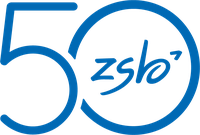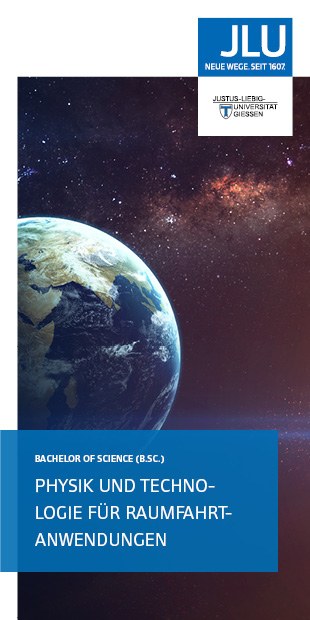Physics and Technology for Space Travel Applications (B.Sc.)
Taught in German| Cooperative Study Programme with THM
Overview
- Overview
-
Brief information on the degree course
The high-technology sector of space travel with its extreme demands on materials and techniques requires an interdisciplinary approach involving mathematics, informatics, natural sciences and engineering in order to achieve the highest goals, such as a manned mission to Mars or the further development of the commercially used satellite network. Training specialists in space travel applications with a broad knowledge of the fundamental sciences is the goal of the Bachelor of Science (B.Sc.) degree course “Physics and Technology of Space Travel Applications” introduced in Winter Semester 2017/18 and of the Master of Science (M.Sc.) degree course to begin in Winter Semester 2020/21. Both degree courses are situated between physics and electrical engineering and are taught in conjunction with the Technische Hochschule Mittelhessen- University of Applied Sciences.
As a student in this programme, you will gain
- advanced knowledge of content and methods through an interdisciplinary training in the two main subjects of physics and electrical engineering;
- specialised knowledge enabling you to independently identify current problems and find solutions in physico-engineering technologies in the field of space travel, e.g. on satellites;
- advanced theoretical and/or practical knowledge in elective subjects;
- additional skills enabling you to prepare for career opportunities in the interdisciplinary field of space travel
Further information
More on this... (in German)
Composition of the Study Programme
- Composition of the Study Programme
-
Composition of the Study Programme
Modules
1st semester 2nd semester Electrical Engineering I (8 CP) Electrical Engineering II (7 CP) Informatics for Engineers I (5 CP) Informatics for Engineers II (5 CP) Experimental Physics I (6 CP) Experimental Physics II (6 CP) Experimental Physics I - practical training (3 CP) Experimental Physics II - practical training (3 CP) Mathematical methods I (6 CP) Measuring Technology (5 CP) Tutorial on Space Travel I (2 CP) Tutorial on Space Travel II (2 CP) 3rd semester 4th semester Technical internship (4 CP) Control engineering (7CP) Electronics (7 CP)
Theoretical Physics II: Electrodynamics and Thermodynamics (8 CP)Transformations (6 CP) - Elective module II
- Elective module III (15 CP in total for elective modules II and III)
Theoretical Physics I: Mechanics and Quantum Mechanics (8 CP) Elective module I (6 CP) 5th semester 6th semester Technology in Space (6 CP) External internship Physics in Space (6 CP) Thesis Colloquium (3 CP) Experimental Physics III for Physicists: Atomic- and Molecule Physics (6 CP) Bachelor Thesis (12 CP) Elective module IV (5 CP) Study Project (7 CP) Examples of possible required elective modules 1 in the winter semester:
- Fundamentals of Micro- and Nanostructuring (JLU, Faculty 07, Physics) 6 CP
- Design of Circuit Boards and Devices (THM, Faculty 02, Elektrical Engineering) 7 CP
- Fundamentals of VLSI-Design (THM, Faculty 02, Elektrical Engineering) 7 CP
- Power Electronics (THM, Faculty 02, Elektrical Engineering) 7 CP
- Simulation with Matlab and Simulink (THM, Faculty 02, Elektrical Engineering) 3 CP
- General Chemistry (JLU, Faculty 08, Chemistry) 6 CP
- Numerical Mathematics 1 (JLU, Faculty 07, Mathematics) 9 CP
Examples of possible required elective modules 2 and 3 in the summer semester- Experimental Physics IV: Solid State Physics (JLU, Faculty 07, Physics) 6 CP
- Computer Aided Engineering (CAE) (THM, Faculty 02, Elektrical Engineering) 5 CP
- Elektromagnetic Compatability (THM, Faculty 02, Electrical Engineering 7 CP
- Microcomputer Systems (THM, Faculty 02, Elektrical Engineering) 7 CP
- General Chemistry (JLU, Faculty 08, Chemistry) 6 CP
- Chemistry: Practical Training (JLU, Faculty 08, Chemistry) 6 CP
- Numerical Mathematics 2 (JLU, Faculty 07, Mathematics) 9 CP
Additional required elective modules (from physics, advanced materials, informatics, mathematics, chemistry, electronical engineering- and information technology or mechanical engineering) can be found in the course cataloge of the JLU and the Technische Hochschule Mittelhessen-University of Applied Scienes
Courses offered by the Technische Hochschule Mittelhessen-University of Applied Sciences
Information on the composition of the degree programme can be found in the special regulations of JLU
Career Options
- Career Options
-
Perspectives
Options for further study at JLU
Master's degree programmes
- Physics (MSc)
- Physics and Technology for Space Travel Applications (MSc), planned for the winter term 2020/21
Doctorate possible with a Master's degree. More on this...
Professional fields
Out of Space -Into the Job
A guarantee to find a job after graduating from university does not exist. The way to start working life depends on many factors- including you. But we can assure you, that a successfully completed degree in Physics and Technology for Space Travel Application offers you many possibilities.
Technologies that are shaped and influenced by physics are in high demand: the spectrum ranges from highly efficient solar panels for energy conversion over electric space flight engines to laser applications in communication systems. The satellite market grows because of a permanent increasing demand for communication and data exchange.
Industrial companies including Airbus, OHB and Thales as well as the space agencies ESA and DLR emphasize that qualified young professionals, especially in the area of key technologies for electric space prolusion, are missing, and not only in Germany. Therefore, the primary objective of Physics and Technology for Space Travel Application is to train experts.
Professional fields for physicists
Apart from the specialised areas in aerospace engineering, all fields of activity that hire physicists can offer you a perspective. This may include the industrial sector, research institutes, administration, the banking sector, consultation companies and patent systems, which all place great demands on analytic, systematic and synthetic competences:
- Chemical industry,
- Energy technology,
- Mechanical engineering,
- Environmental technology,
- Management consulting,
- Information technology etc.
Most physicists find an employment in the industrial sector, the service sector or at institutions of higher education including universities. Industrial physicists in large enterprises work mainly in research and development. Nevertheless, working in production, distribution or management is also a possible work field.
Until now, job opportunities in medium-size businesses developed insufficiently.
The areas of communication, information technology and the banking sector appreciate more and more, especially in the last few years, the competences of physicist as independently working “problem solvers”. The traditional wide professional field of a physicist shifts continuously on the basis of the development of science and technology.
Application
- Commencement of Studies in the Winter Semester
-
Commencement of studies
Only possible in the winter semester
- Entrance Requirements Abitur ohne Praktikumsnachweis
-
Entrance requirements
- Applicants must have an Abitur (German school leaver's examination for university entrance) or equivalent. More on this...
- Certification of a pre-professional practical period is not required.
-
Special regulations apply to foreign applicants or those who gained their university-entrance qualifications abroad. Read more...
- Preliminary courses (the courses are not obligatory)
-
- Preliminary online course: Mathematics (basics) (in German)
- Mathematics (general) (in German)
- Mathematics for Physics/ Advanced Materials (in German)
- Application not limited only winter
-
-
Application / Enrolment
-
The study programme is not subject to admission restrictions.
-
The enrolment period for the winter semester begins at the beginning of June.
-
The end of the enrolment period is determined anew each year, please enquire in the application portal during the enrolment period.
Different rules apply in some cases for international applicants. More...
-
-
Further Information
- Further Information: Documents
-
PDF documents for the courses of study
- Flyer: in progress
- Study guide: in progress
Examination- and study regulations
- Special regulations (in German)
(with module descriptions and module plans) (in German)
(Please note that only the German version of the modules is offical and legally binding. The english Version is for informative purposes only.) - General study regulations for modular and multi-stage study programmes
Courses offered in the course catalogue
- Electronical course catalogue (in German)
- Bachelor's Degree Programmes of Faculty 07
- International pages
-
Please have a look at our International Pages for more information in English.
- Any Questions
-

Any Questions?
Information- and advisory services of JLU can be found under the category “contact” on this page!
- Help
-
Do you need assistance in choosing the right courses of study?
- Offers: Courses of study
-
Which courses of study suits me best?

Ask Justus offers information for prospective students
Events for prospective students

There is a whole range of events offered by JLU, current events can be found under “news”:
www.uni-giessen.de/studium (in German)
Contact
- Subject Advisors
-
-
Justus Liebig University Giessen
Prof. Dr. Peter J. Klar
Justus Liebig University Giessen
I. Physikalisches Institut
Heinrich-Buff-Ring 16
35392 GiessenPhone: +49 (0)641 99-33190
email: Peter.J.KlarTHM University of Applied Sciences
Prof. Dr.-Ing. Uwe Probst
THM University of Applied Sciences
Fachbereich Elektro- und InformationstechnikPhone: +49 (0)641 309-1935
email: uwe.probst
-
- Central Study Advisor
- Beate Pitzler
- Central Student Services
-
- Students office →
(for formal matters like matriculation) - Central student advisory office
(advice for students & prospective students) - Hotline Call Justus
(first contact for all matters pertaining to studies) - International office →
(for international students)
- Students office →

